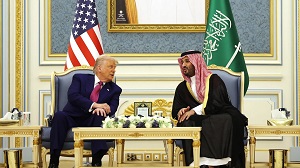Global integration and the new landscape of international business - By Mohammed Khair Abu Saalik, The Jordan Times
Foreign direct investment (FDI) remains one of the central engines of global integration, shaping how countries grow and compete in an interconnected economy. Through FDI, firms establish long-term operations abroad — either by building new facilities or acquiring existing companies — bringing with them capital, technology and managerial expertise. But the effects of these investments vary widely depending on how and where they are made.
Greenfield investments, where companies construct new operations from scratch, tend to offer the most immediate and visible gains to host economies. They generate employment, require new infrastructure and often introduce advanced technologies. The wave of Japanese automotive factories built in the United Kingdom, for example, created thousands of jobs and boosted export capacity while helping revive industrial regions. These benefits, however, take time. Construction, recruitment and training must unfold before economic returns become clear.
Acquisitions, by contrast, typically cause fewer short-term disruptions. When a foreign firm buys a domestic company, production and employment often remain steady at first. The long-term outcome depends on the new owners’ strategy. Some expand production or modernise operations, while others streamline and cut costs. Thus, acquisitions can be either catalysts for growth or sources of local concern.
The broader impact of FDI ultimately depends on how deeply foreign subsidiaries integrate with local economies. When they source materials and services domestically, they strengthen supplier networks and spread benefits more widely. When they rely heavily on imported inputs, local spillovers are limited. Another factor is the mobility — or “footlooseness” — of multinational firms. While capital-intensive investments such as automobile assembly are less likely to relocate on short notice, global competition and shifting geopolitical conditions can still motivate companies to move production elsewhere.
This blend of opportunity and vulnerability defines the host-country experience. FDI can foster employment, raise skill levels, stimulate innovation and enhance competitiveness. Yet concerns persist about low-value jobs, limited local ownership and the potential loss of control over strategic sectors.
The effects of investment abroad extend to the home countries of multinational firms as well. Traditional thinking cast outward FDI as a drain on domestic employment and capital. But growing evidence suggests the opposite: Overseas investment can strengthen firms at home. By operating in foreign markets, companies gain access to new technologies, talent pools and market intelligence. Cross-border acquisitions bring intangible assets, brand identities, managerial expertise and established distribution networks, that enhance the global capabilities of the parent company.
Exposure to global competition often pushes firms to innovate domestically, raising productivity and spurring further investment. Still, governments remain divided on how strongly to support outward FDI. Some offer tax incentives or political backing, viewing international expansion as a path to long-term competitiveness. Others worry about offshoring and weakened local industries. Crafting policy requires balancing these competing considerations with a realistic assessment of long-run national benefits.
In today’s global economy, knowledge has become the currency of competitive advantage. FDI serves as a major channel for transferring knowledge, both codified information that can be documented, such as blueprints, and tacit knowledge embedded in experience, routines and interpersonal relationships. Tacit knowledge is harder to transmit but often the most valuable. It moves through interactions, training and shared problem-solving.
Wholly owned subsidiaries give multinational corporations tight control over technology while enabling selective knowledge transfer. Joint ventures encourage two-way learning between foreign and domestic partners, allowing local firms to absorb new skills and adapt global practices. Beyond the corporate sphere, domestic companies can learn from foreign competitors, provided they possess the absorptive capacity — the skills, infrastructure and managerial expertise, to apply what they observe.
These dynamics are amplified by global value chains (GVCs), which break production into specialised stages across multiple countries. Participation in GVCs gives firms access to global markets and advanced technologies, but it also exposes local economies to new vulnerabilities. Countries that specialise in low-skill or assembly tasks often capture only a small share of total value added, reinforcing existing development gaps.
The growing presence of multinational firms has revived long-standing debates about sovereignty and national interest. Governments welcome the capital and expertise FDI brings yet remain wary of allowing foreign control over sensitive industries. Concerns about tax avoidance, profit shifting and corporate lobbying have pushed many countries to adopt or strengthen investment-screening mechanisms. The global turn toward sustainable and responsible investment reflects a desire to balance openness with oversight, attracting beneficial FDI while protecting national security, labour standards and the environment.
A parallel transformation is unfolding through digital globalisation. Advances in computing power, connectivity and data analytics have allowed firms of all sizes to operate internationally without a major physical presence abroad. Digital industries, cloud computing, telecommunications, e-commerce, now sit at the heart of global economic integration.
Artificial intelligence accelerates this shift, automating routine tasks, optimising logistics and analysing vast data streams. Generative AI produces content and insights, while emerging systems act autonomously, making strategic decisions in real time. These technologies promise efficiency but raise questions about governance, accountability and data privacy.
Global digital platforms such as Amazon, Google and PayPal reduce traditional barriers to trade by connecting buyers, sellers and service providers worldwide. For small and medium-sized enterprises, these platforms offer unprecedented access to global markets. Yet they also concentrate economic power, heightening concerns about competition and control over user data.
Digitalisation blurs the boundaries between goods, services and information. It enhances global coordination but exposes economies to cyber risks and regulatory challenges. Ensuring ethical use of AI and protecting privacy have become essential components of global economic governance.
The evolving landscape of international business is defined by deeper integration and increased complexity. FDI and GVCs bind economies together, while knowledge and digital technologies shape competitive advantage. The nations and firms that thrive in this environment will be those that balance openness with strategic oversight and technological progress with ethical responsibility.
Latest News
-
 US, Saudi approve F-35 jets sale
US, Saudi approve F-35 jets sale
-
 Saudi Crown Prince says working to normalize relations “as soon as possible” with ‘Israel’
Saudi Crown Prince says working to normalize relations “as soon as possible” with ‘Israel’
-
 Spain PM announces $710 million in military aid for Ukraine
Spain PM announces $710 million in military aid for Ukraine
-
 Prime minister reiterates centrality for Palestinian cause for Jordan
Prime minister reiterates centrality for Palestinian cause for Jordan
-
 Trump to meet Saudi Crown Prince on Tuesday
Trump to meet Saudi Crown Prince on Tuesday